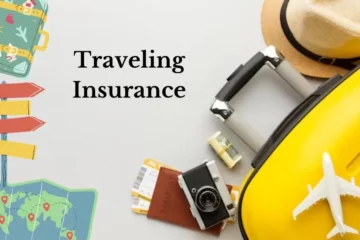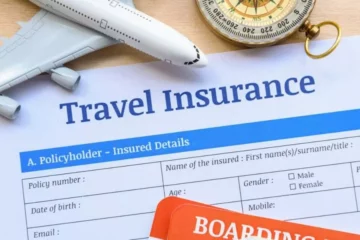Why Travel Insurance for Adventure Seeker Must-Have

Adventure travel is an exciting and thrilling experience, but it’s not without its risks. Whether you’re hiking, skiing, or scuba diving, there is always a chance of injury or accident. Adventure sports have inherent risks that can lead to serious injuries, and in some cases, even death. For instance, a fall while rock climbing or getting lost while hiking in unfamiliar terrain can be a nightmare. These risks are why you need to consider getting travel insurance before embarking on your next adventure.
Travel insurance provides protection against unexpected events that can interrupt or cancel your trip. It also covers you in case of unforeseen emergencies and accidents that can happen during your adventure. A travel insurance policy can help you avoid financial losses and ensure that you are prepared for any medical emergencies that may arise during your travels.
It’s essential to note that adventure travel insurance policies are different from standard travel insurance policies. Adventure travel policies are designed specifically for people who engage in high-risk activities like rock climbing, scuba diving, and skiing. These policies offer additional coverage that standard travel insurance policies don’t provide, such as emergency evacuation and repatriation.
Benefits of travel insurance for adventure seekers
The benefits of travel insurance are numerous, but they are especially important for adventure seekers. Here are some of the advantages of getting travel insurance for your next adventure:
- Medical emergencies: No matter how careful you are, accidents can happen during your adventure. Travel insurance can provide coverage for medical emergencies such as accidents, illnesses, and injuries. This coverage can help you avoid expensive medical bills and ensure that you receive the necessary medical care.
- Trip cancellation or interruption: If you need to cancel your trip due to unforeseen circumstances, such as a family emergency or illness, travel insurance can help cover the costs associated with canceling or interrupting your trip. This can include non-refundable deposits, pre-paid expenses, and other costs.
- Travel delays: Travel delays are common, and they can be frustrating and costly. With travel insurance, you can be reimbursed for expenses such as hotel accommodations, meals, and transportation if your trip is delayed due to unforeseen events like inclement weather or mechanical issues.
- Emergency evacuation: If you’re engaged in high-risk activities like mountaineering or backcountry skiing, emergency evacuation coverage is essential. This coverage can help cover the costs associated with emergency medical transportation if you’re injured or become ill during your adventure.
Types of travel insurance policies
There are different types of travel insurance policies to choose from, depending on your needs and budget. Here are some of the most common types of travel insurance:
- Trip cancellation insurance: This type of insurance provides coverage for canceling your trip due to unforeseen circumstances such as illness, injury, or death.
- Medical insurance: Medical insurance provides coverage for medical emergencies that may occur during your trip. This can include accidents, illnesses, and injuries.
- Evacuation insurance: Evacuation insurance provides coverage for emergency medical transportation if you’re injured or become ill during your adventure.
- Baggage insurance: Baggage insurance provides coverage for lost, stolen, or damaged baggage during your trip.
- Flight insurance: Flight insurance provides coverage for flight-related incidents such as flight cancellations, delays, or missed connections.
What to look for in a travel insurance policy
When choosing a travel insurance policy, there are several factors to consider. Here are some of the things you should look for in a travel insurance policy:
- Coverage: The policy should provide coverage for the specific risks associated with your adventure.
- Exclusions: Read the policy carefully to understand what is excluded from the coverage. For instance, some policies may exclude coverage for pre-existing medical conditions.
- Limits: The policy should have adequate limits to cover any potential losses or expenses.
- Deductibles: Check the policy’s deductible to understand how much you’ll have to pay before the insurance kicks in.
- Reputation: Look for a reputable and reliable travel insurance provider with a good track record of paying claims promptly.
FAQs about travel insurance
- Do I need travel insurance for domestic travel?
While travel insurance is not mandatory for domestic travel, it’s still a good idea to have coverage in case of unforeseen circumstances such as medical emergencies or trip cancellations.
- Can I purchase travel insurance after booking my trip?
Yes, you can purchase travel insurance after booking your trip, but it’s recommended to purchase it as soon as possible to ensure that you’re covered for any unforeseen events that may occur.
- What if I have a pre-existing medical condition?
Some travel insurance policies may exclude coverage for pre-existing medical conditions. However, some policies may offer coverage if you purchase the policy within a certain time frame after booking your trip.
- What if I need to cancel my trip due to COVID-19?
Many travel insurance policies offer coverage for trip cancellations due to COVID-19. However, it’s essential to read the policy carefully to understand the terms and conditions.
How to purchase travel insurance
Purchasing travel insurance is easy and convenient. You can purchase travel insurance online through various travel insurance providers or through your travel agent. Here are some tips to help you purchase travel insurance:
- Compare policies: Take the time to compare policies and prices to find the best coverage for your needs.
- Read the policy carefully: Make sure you read the policy carefully and understand the coverage and exclusions.
- Purchase early: Purchase your travel insurance as soon as possible to ensure that you’re covered for any unforeseen events that may occur.
- Keep a copy of the policy: Make sure to keep a copy of your travel insurance policy with you during your travels.
Top travel insurance providers
There are numerous travel insurance providers to choose from, but here are some of the top providers to consider:
- World Nomads: World Nomads is a popular travel insurance provider for adventure seekers. They offer coverage for a variety of adventure sports and activities.
- Allianz: Allianz is a well-known travel insurance provider that offers a range of travel insurance policies.
- Travel Guard: Travel Guard offers comprehensive travel insurance coverage for a variety of travel-related risks.
- IMG Global: IMG Global offers a range of travel insurance policies, including coverage for adventure sports and activities.
Real-life examples of travel insurance claims
Here are some real-life examples of how travel insurance has helped adventure seekers:
- A traveler who was injured while hiking in Patagonia received emergency medical evacuation coverage that covered the costs associated with the medical transportation.
- A couple who had to cancel their honeymoon due to a family emergency received reimbursement for their non-refundable deposits.
- A group of travelers who had their trip delayed due to a snowstorm received reimbursement for their hotel accommodations and meals.
Conclusion: Why travel insurance is essential for adventure seekers
Travel insurance is an essential investment for adventure seekers. It provides protection against unforeseen events that can interrupt or cancel your trip and covers you in case of medical emergencies or accidents. Adventure travel insurance policies offer additional coverage that standard travel insurance policies don’t provide, such as emergency evacuation and repatriation. When choosing a travel insurance policy, it’s essential to consider the coverage, exclusions, limits, deductibles, and reputation of the provider. By purchasing travel insurance, you can have peace of mind knowing that you’re protected and prepared for any unexpected events that may occur during your adventure.








